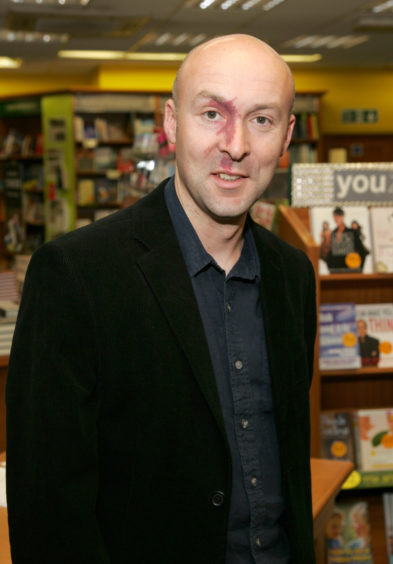“The legal side of things is far from my area of expertise, I primarily deal in lies,” does not sound like the most promising opening statement when giving evidence to a parliamentary committee looking at defamation law.
But that was how one expert witness introduced himself to MSPs on Holyrood’s Justice Committee as they considered the proposed Defamation and Malicious Publications (Scotland) Bill.
But the twist was that the candid admission came from the best-selling crime writer and master of the Tartan Noir genre Christopher Brookmyre. On that basis it made much more sense.
During an unusual session of the Justice Committee, Mr Brookmyre gave an insight into his literary techniques while suggesting publishers were becoming more demanding when it came to keeping within the law and spoke of his distaste for “cowardly” organisations who resort to defamation claims.
In a zoom meeting of the committee, his evidence contrasted with the drier contributions from academics and lawyers who focused on potential short-comings of the proposed new Bill.
Mr Brookmyre, however, talked of his penchant for grotesque parodies, unflattering characters and revealed the existence of a mystery over the original identity of one of his characters that even his most famous character Jack Parlabane might struggle to solve.
The author revealed he had to change the name of one of his characters in the novel Fallen Angel to avoid falling foul of the lawyers.
When asked if defamation laws had had a “chilling effect” on his freedom of artistic expression, the award-winning novelist reflected on how his style had changed over the years.
Protected by the law of fiction
“I started off – 25-years ago – writing more overtly satirical fiction in which there were often quite grotesque parodies of – not identifiable public figures – but certainly identifiable behaviour and attitudes,” the novelist said.
“I think I would have always at that point felt that I was protected by the law of fiction, the fact that these were often amalgams of individuals. But I am conscious at times that there’s a danger someone might identify themselves too closely with a fiction depiction and it is perhaps just something I am conscious of myself. I don’t want to be causing a problem for my publisher. I don’t want my book to get bogged down in litigation in any way.”
At times, he was conscious that he might hold back while writing due to his “natural cautiousness”, although he admitted this might not always be “rationally based”.
However there had been times he had been advised to change the names of companies or institutions and even a character in the case of his novel Fallen Angel.
I had to change the name of a major character in my novel Fallen Angel because the name just sounded a bit too much like a real person. And given the crimes the character was going to be depicted as committing. Obviously, we didn’t want to claim there was any overlap here.”
Christopher Brookmyre
“I have on occasion had editorial notes saying can you change this because we might be laying ourselves open?” he said. “And there’s times when I’ve thought this was a ridiculous concern, because it was often too grotesque or something that was clearly meant as a joke. I have noticed it more and more in recent years. That I am getting editorial notes saying can you change this so that it is not too obviously identifiable with a particular individual? Or even a particular institution or a company.”
Sometimes, the writer said, he had been told a character’s name should be changed because it sounded too much like someone else.
“I had to change the name of a major character in my novel Fallen Angel because the name just sounded a bit too much like a real person,” he confessed. “And given the crimes the character was going to be depicted as committing. Obviously, we didn’t want to claim there was any overlap here. The person did work in the same field which was going to put myself more in jeopardy of an accusation that I had intended a comparison with this real person.”
Presumably existing defamation laws or even the new Defamation and Malicious Publications (Scotland) Bill will ensure that the original name of the character remains an eternal mystery.
Great Expectations?
The SNP MSP Annabelle Ewing asked the novelist if he had a “great expectation” that the new bill would have an impact on his writing. It was unclear whether her Dickensian reference was deliberate.
In any case, Mr Brookmyre failed to acknowledge it when he told her he was “not convinced” that it would. Writers of fiction, he said, were “less wary” of litigation.
“The realm of fiction, I would have to admit, is quite rarely damaged by this,” he explained. ”Because there is often the opportunity to write characters that are very unflattering and people are reluctant, for good reason, to say: ‘you know that unflattering depiction – hey, that’s me’.”
He also offered a staunch defence of the writer’s right to satirise institutions.
“I would always reserve the freedom to give my impressions of how an institution, an authority or a company is conducting themselves,” Mr Brookmyre said. “Within the realm of fiction you are sometimes creating a parody of that – a grotesque exaggeration of that.
“Because sometimes it is necessary to blow up the unpalatable aspects in order to draw attention to them. Necessarily you are going to create a depiction that is particularly unflattering if you are going to draw attention to something that you think is wrong.”
Linked to that was his disapproval of institutions which resorted to defamation as a means of distracting from things that were wrong with it.
“As a lay person, I don’t see that a public authority should be able to have resource to defamation law to remedy that… I think it is slightly cowardly to say that we as an organisation are being defamed by your depiction,” he said.
“I think individual behaviour should be accountable and corporate behaviour should be accountable. But it should be accountable on the basis of the behaviour of individuals collectively. So my instinct from a position – admittedly of legal ignorance – is to be uncomfortable with the idea of a local authority, a public body having recourse to defamation proceedings as a means of deflecting criticism.”

